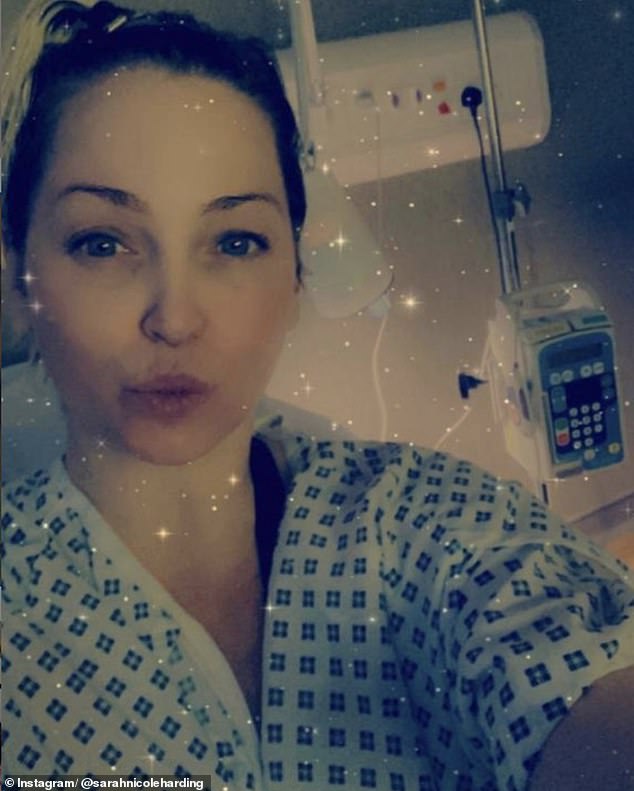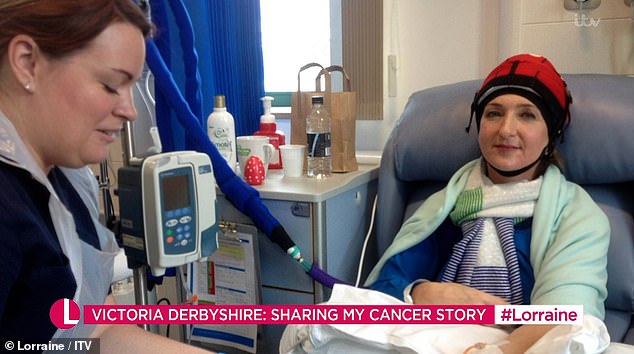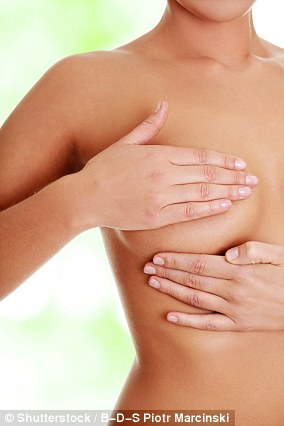Victoria Derbyshire has said Sarah Harding’s death from breast cancer aged just 39 was ‘so brutal and so unfair’ as she praised her ‘legacy’ of helping to raise awareness about the disease.
The BBC News presenter, 52, from Manchester, was diagnosed with the condition herself in 2015 and underwent a mastectomy, six cycles of chemotherapy, and 30 doses of radiotherapy before doctors told her she was in remission five years ago.
Sarah, a member of pop group Girls Aloud, died on September 5 after speaking about her own experience and warning others to get any possible symptoms checked out as soon as possible.
Speaking on Lorrain today, Victoria discussed her own experience with breast cancer and applauded the late singer for raising awareness.

Sarah Harding, who died earlier this month from breast cancer aged 39, shared this photo of herself receiving treatment in hospital on Instagram last month

BBC news presenter Victoria Derbyshire, 52, praised Sarah for raising awareness of breast cancer and some of its lesser-known symptoms
Victoria said: ‘That is Sarah’s legacy. I didn’t know her, I read her book. She wrote in her book that her doctors had told her that last Christmas would be her last Christmas. But that is her legacy.
‘Young women – you know, she was 39 – it’s just so brutal and it’s so unfair – young women, please check your own breasts. If there’s any issue, get straight to the GP, do not mess about.’
Victoria was on the show to discuss MacMillan’s upcoming Coffee Morning charity event, where people get together to have a drink and make a donation, as well as some of the lesser known symptoms of breast cancer.
She urged people to take part and raise money for the charity. Speaking about how she is now, Victoria told Lorraine: ‘I am really well, I am alive, I am grateful every day, I’m happy, I’m one of the lucky ones.’
She added: ‘When you get a cancer diagnosis and you’re going through treatment, you can’t get away from it.

Lorraine said one positive that came out of Victoria’s experience with breast cancer is that she too has been able to encourage people to go the doctor is they notice symptoms

The presenter went through gruelling breast cancer treatment – undergoing a mastectomy, six cycles of chemotherapy, and 30 doses of radiotherapy
‘It’s all-consuming, you just want to get through it, you want to live, you want to live for a long time afterwards. I’m lucky I’ve reached that five-year milestone – it is a milestone – but I don’t take anything for granted.’
She added: ‘My approach to life now is “oh my God, experiences, I want to say yes, let’s do stuff” because none of us knows how long we’ve got.’
Victoria has previously revealed that she realised she may have cancer after noticing she had an inverted nipple, and that her right breast had dropped lower than her left.
She told Lorraine: ‘Women know their own breasts best, so any slight change that looks a bit different from your normal, is just worth getting it checked out.
She added: ‘I don’t want to alarm anyone, because more often than not, it will be nothing. But it’s just worth getting it checked out.’
Lorraine said: ‘Exactly, and making sure you look for the signs…anything that’s out of the ordinary.’
Victoria encouraged people to contact their GPs and tell them they are concerned they have cancer symptoms, so they can get an appointment as soon as possible.
‘If you say you are worried it’s a symptom of cancer, there’s no messing about. The NHS is incredible when it comes to cancer,’ she said.
MacMillan’s official Coffee Morning takes place on Friday September 24.
Breast cancer is one of the most common cancers in the world and affects more than two MILLION women a year 
Breast cancer is one of the most common cancers in the world. Each year in the UK there are more than 55,000 new cases, and the disease claims the lives of 11,500 women. In the US, it strikes 266,000 each year and kills 40,000. But what causes it and how can it be treated?
What is breast cancer?
Breast cancer develops from a cancerous cell which develops in the lining of a duct or lobule in one of the breasts.
When the breast cancer has spread into surrounding breast tissue it is called an ‘invasive’ breast cancer. Some people are diagnosed with ‘carcinoma in situ’, where no cancer cells have grown beyond the duct or lobule.
Most cases develop in women over the age of 50 but younger women are sometimes affected. Breast cancer can develop in men though this is rare.
Staging means how big the cancer is and whether it has spread. Stage 1 is the earliest stage and stage 4 means the cancer has spread to another part of the body.
The cancerous cells are graded from low, which means a slow growth, to high, which is fast growing. High grade cancers are more likely to come back after they have first been treated.
What causes breast cancer?
A cancerous tumour starts from one abnormal cell. The exact reason why a cell becomes cancerous is unclear. It is thought that something damages or alters certain genes in the cell. This makes the cell abnormal and multiply ‘out of control’.
Although breast cancer can develop for no apparent reason, there are some risk factors that can increase the chance of developing breast cancer, such as genetics.
What are the symptoms of breast cancer?
The usual first symptom is a painless lump in the breast, although most breast lumps are not cancerous and are fluid filled cysts, which are benign.
The first place that breast cancer usually spreads to is the lymph nodes in the armpit. If this occurs you will develop a swelling or lump in an armpit.
How is breast cancer diagnosed?
Initial assessment: A doctor examines the breasts and armpits. They may do tests such as a mammography, a special x-ray of the breast tissue which can indicate the possibility of tumours.Biopsy: A biopsy is when a small sample of tissue is removed from a part of the body. The sample is then examined under the microscope to look for abnormal cells. The sample can confirm or rule out cancer.
If you are confirmed to have breast cancer, further tests may be needed to assess if it has spread. For example, blood tests, an ultrasound scan of the liver or a chest x-ray.

How is breast cancer treated?
Treatment options which may be considered include surgery, chemotherapy, radiotherapy and hormone treatment. Often a combination of two or more of these treatments are used.
Surgery: Breast-conserving surgery or the removal of the affected breast depending on the size of the tumour.Radiotherapy: A treatment which uses high energy beams of radiation focussed on cancerous tissue. This kills cancer cells, or stops cancer cells from multiplying. It is mainly used in addition to surgery.Chemotherapy: A treatment of cancer by using anti-cancer drugs which kill cancer cells, or stop them from multiplyingHormone treatments: Some types of breast cancer are affected by the ‘female’ hormone oestrogen, which can stimulate the cancer cells to divide and multiply. Treatments which reduce the level of these hormones, or prevent them from working, are commonly used in people with breast cancer.
How successful is treatment?
The outlook is best in those who are diagnosed when the cancer is still small, and has not spread. Surgical removal of a tumour in an early stage may then give a good chance of cure.
The routine mammography offered to women between the ages of 50 and 70 mean more breast cancers are being diagnosed and treated at an early stage.
For more information visit breastcancercare.org.uk, breastcancernow.org or www.cancerhelp.org.uk
Advertisement
Source link : https://www.dailymail.co.uk/femail/article-10016127/Victoria-Derbyshire-says-Sarah-Hardings-death-breast-cancer-aged-just-39-brutal.html











